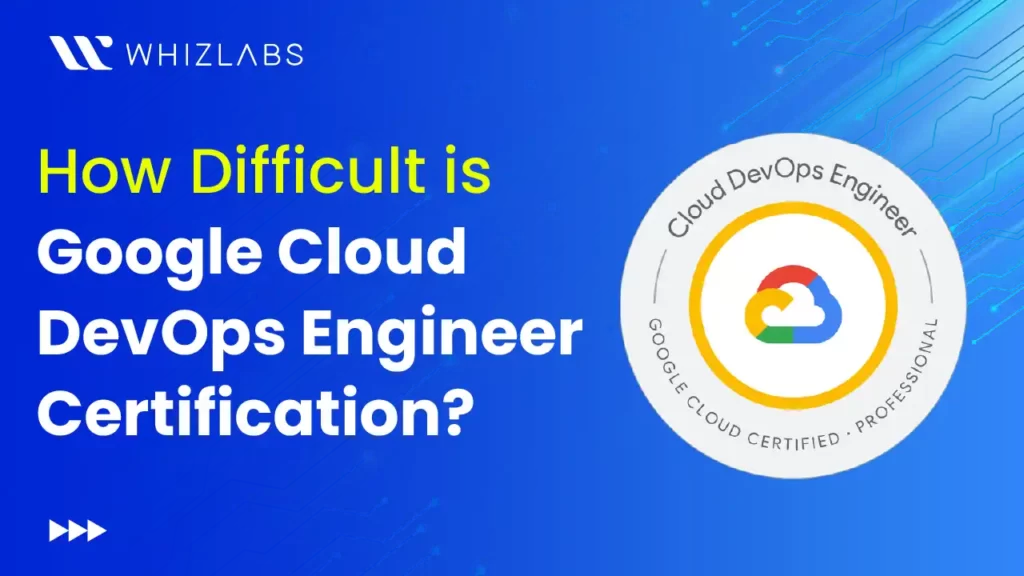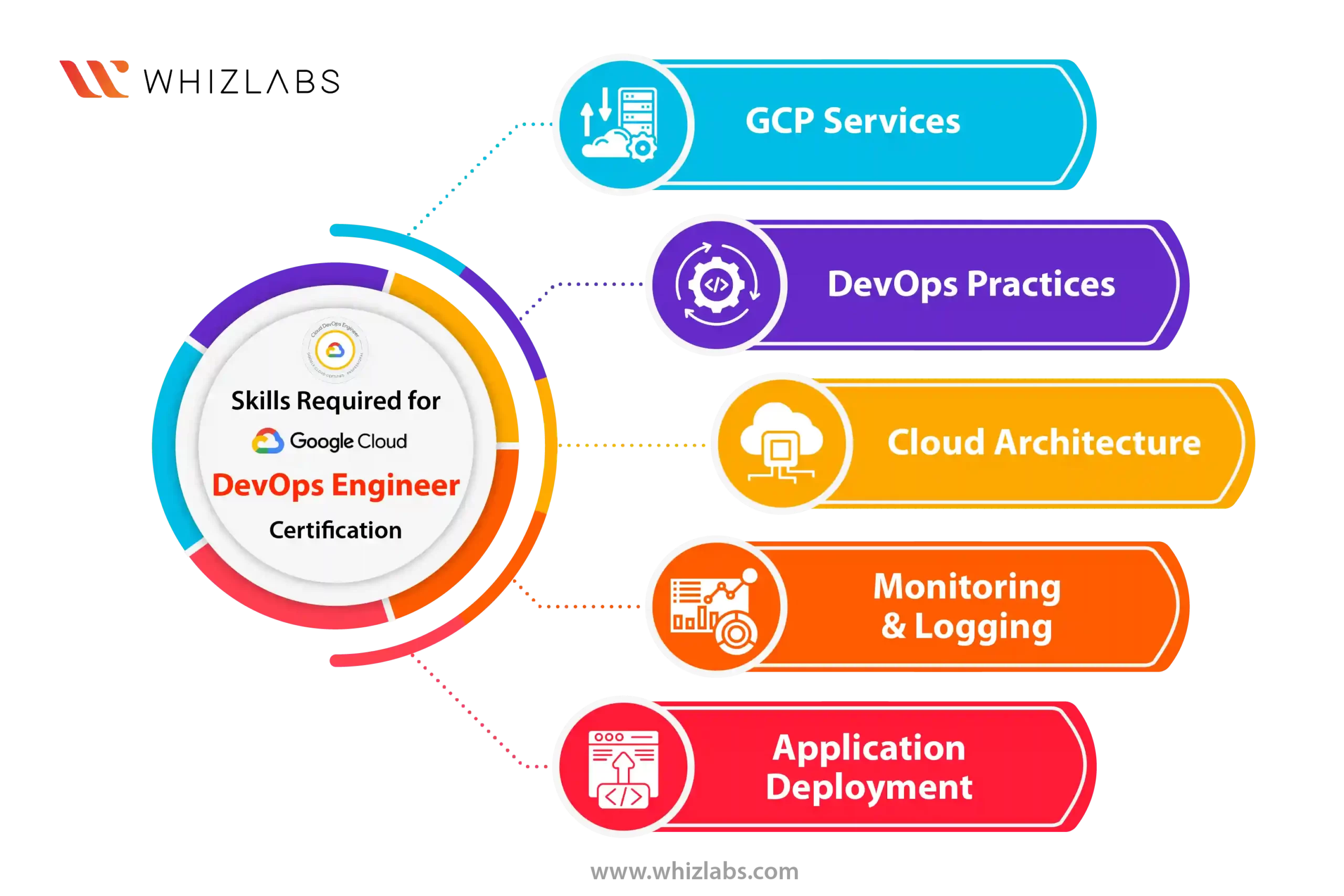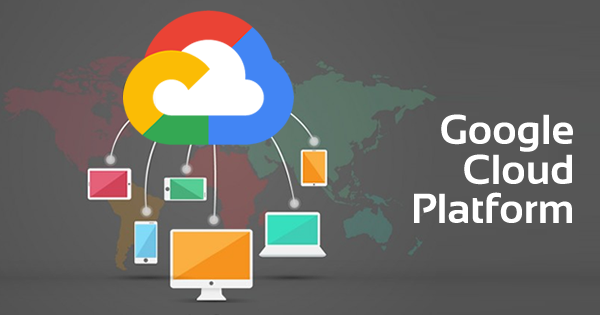The Google Cloud DevOps Engineer Exam is somehow difficult to pass but with thorough preparation and dedication, you can ace it easily. Aspiring candidates often seek clarity on the difficulty level of such certifications before taking the exam.
With our expert guidance, we’ll delve into the Google Cloud DevOps Engineer certification difficulty level and recommend study materials to tackle it with confidence.
Let’s dive in!
Understanding Google Cloud DevOps Engineer Certification
Google Professional Cloud DevOps Engineer (GCP) certification is a professional-level certification released by Google Cloud. It validates an individual’s knowledge and skills in managing and automating software development processes and infrastructure deployment in a cloud environment.
This certification is fit for those who have experience working with Google Cloud Platform (GCP), cloud-based infrastructure, DevOps practices, and continuous integration and delivery.
The Google Cloud Professional Cloud DevOps Engineer exam covers a wide range of topics including:
- Deploying continuous integration and delivery (CI/CD) pipelines with the help of GCP tools, including Cloud Build and Container Registry.
- Manage and implement applications using Kubernetes and GKE.
- Configure and manage the GCP services
- Deploy and manage security and compliance in a cloud environment.
- Troubleshoot and debug cloud-based apps and infrastructure.
- Monitoring and logging with the help of tools such as Stackdriver and Cloud Logging.
How difficult is Google Cloud DevOps Engineer certification?
The difficulty of the Google Professional Cloud DevOps Engineer (GCP) Exam indeed varies based on an individual’s prior experience with cloud computing, DevOps practices, and Google Cloud Platform (GCP).
Here are some factors that impact the Google Cloud DevOps difficulty level:
Prior Cloud Experience: If you’re already familiar with cloud fundamentals, the learning process might be easier. However, newcomers to cloud computing will need to spend more time grasping core concepts before focusing on GCP-specific aspects.
Spending time understanding fundamental cloud principles will lay a strong groundwork for comprehending the intricacies of Google Cloud Platform (GCP) services and their integration into DevOps practices.
It is recommended to have a grasp of the following skills and knowledge:
- GCP Services: Must be familiar with the GCP services, such as computing, storage, networking, and security.
- DevOps Practices: Diving in-depth into the DevOps practices, such as continuous integration, continuous delivery, and infrastructure as code, is essential.
- Cloud Architecture: Must know the cloud architecture concepts and how we can employ them to achieve scalability, availability, and security.
- Monitoring and Logging: Must have a clear understanding of how to use monitoring and logging techniques, and tools such as Stackdriver and Cloud Logging.
- Application Deployment: Must know how to deploy applications, including containerization and orchestration with the help of Kubernetes.
DevOps Expertise: Having a strong foundation in DevOps methodologies is crucial. This includes understanding CI/CD, infrastructure as code (IaC), and configuration management, all of which are heavily emphasized in this exam
A well-versed knowledge of these concepts not only helps to pass the exam but also assists the developers in delivering efficient software delivery pipelines in real-time.
Moreover, familiarity with the DevOps principle and practices benefit you in the following ways:
- Design and deploy CI or CD pipelines efficiently
- Automate the infrastructure provisioning
- Configuration change management within cloud environment
Hands-on GCP Knowledge: While theoretical knowledge is important, practical experience with GCP services like Cloud Build, Cloud Functions, Cloud Monitoring, and Kubernetes Engine is invaluable. This exam often presents real-world scenarios where you’ll need to apply your knowledge to solve problems within the GCP environment
You can take Google Cloud hands-on labs to gain familiarity with the GCP services. Below, I have listed some of the Google Cloud DevOps Engineer hands-on labs.
- Integrating MongoDB Atlas with Google Cloud Compute Engine
- Monitoring GKE with Open-Source Tools
- Using Cloud DNS with GKE
- Handle Deployment versioning in GKE with Rolling update
Based on the expert level, the hands-on labs have been categorized. As per your expertise level, pick the right hands-on labs.
Exam Strategy: Time management is key during the exam. You need to be able to quickly analyze questions and avoid getting stuck on specific details. Practicing with online resources such as practice exams can help simulate the actual testing environment and improve your exam-taking skills.
You can opt for the Google Cloud DevOps Engineer Practice test to familiarize yourself with the exam formats and identify your weak areas.
When you appear for the real exam, you can take the exam with high confidence as you already adapted to the exam environment by taking the Google Professional Cloud DevOps Engineer Certification Exam Questions.
Considering the above factors can help to overcome the difficulty in clearing this exam.
What Experience is required for the Google Professional Cloud DevOps Engineer?
There are no formal requirements available for the Google Professional Cloud DevOps Engineer.
However, it is recommended to have at least three years of industry experience before taking the exam. Also, you must have experience in the cloud and knowledge of cloud service provider networks.
Apart from this, you must have at least one year of cloud solutions management specifically on Google Cloud before taking the Google Professional Cloud DevOps Engineer exam.
Having familiarity with the Google Cloud tools and utilities, knowledge of deployment and configuration, enterprise networks, service provider clients, and getting your hands dirty with SLOs, SLIs, and SLOs can be beneficial.
Skills required for Google Cloud DevOps Engineer Certification
To clear the Google Professional Cloud DevOps Engineer exam, you must have a strong grasp of the following topics:
- GCP Services: You must have a thorough understanding of the GCP services such as computing, storage, networking, and security.
- DevOps Practices: Must know the DevOps practices, such as continuous integration, continuous delivery, and infrastructure as code.
- Cloud Architecture: You must familiarize yourself with the cloud architecture concepts, scalability, availability, and security.
- Monitoring and Logging: Should know monitoring and logging techniques, and how to use the tools such as Stackdriver and Cloud Logging.
- Application Deployment: The grasp of application deployment, containerization, and orchestration using Kubernetes is significant.
Tips to overcome Google Cloud DevOps Certification Exam Difficulty
Preparing for the Google Cloud DevOps Certification Exam demands a significant amount of hard work and dedication.
The individuals who passed this exam have revealed that you must follow the structured study plan and rely upon authentic and reliable study resources to pass this exam on the first try.
You can follow the systematic study approach as listed below:
Review the exam Guide
Before you begin your preparation, you must have a clear understanding of Google Cloud DevOps Engineer Certification Exam objectives. Refer to the official Google Professional Cloud Devops Engineer Study guide to make yourself familiar with the exam domains.
Google Cloud provides an extensive learning path tailored for the Professional Cloud DevOps Engineer Certification exam. This path offers candidates the necessary tools and knowledge to excel as Cloud DevOps Engineers.
The Cloud DevOps Engineer learning path comprises four courses and 13 labs, covering essential topics such as core Google Cloud infrastructure concepts, Google’s SRE culture, designing Google Cloud deployments, and various cloud logging and monitoring concepts.
Candidates have the option to choose between online training or instructor-led training. Additionally, Whizlabs offers a comprehensive course designed to assist candidates in preparing for the Professional Cloud DevOps Engineer certification exam.
You can also read books relevant to the exam topics. GCP itself provides a set of books on Site Reliability Engineering, which helps to sharpen your skills.
Here are some books for your reference:
- Building Secure & Reliable Systems: Best Practices for Designing, implementing and Maintaining Systems
- The Site Reliability Workbook: Practical ways to implement SRE
- Site Reliability Engineering by Oreilly
Take training courses
Online courses allow learners to progress through the material at their own speed, enabling them to revisit difficult concepts or skip ahead to more advanced topics as needed.
This personalized approach to learning ensures that individuals can tailor their studies to suit their learning styles and preferences.
The below-listed Google Cloud DevOps training courses can assist you in preparing effectively for this exam:
- Google Cloud DevOps Fundamentals: This course educates you on Google Cloud basic concepts, DevOps principles and practices, CI/CD pipelines, and much more.
- Professional Cloud DevOps Engineer Certification Course: In this training course, Whizlabs incorporates practice tests, video courses, hands-on labs, and a sandbox to gauge your knowledge of GCP DevOps.
Attempt practice tests
To assess your exam preparedness, take practice tests. You can opt for the Google Cloud DevOps Engineer Practice test to familiarize yourself with the exam formats and identify your weak areas.
When you appear for the real exam, you can take the exam with high confidence as you already adapted to the exam environment by taking the Google Professional Cloud DevOps Engineer Certification Exam Questions.
Hands-on Experience with Labs
Effective preparation combines theoretical and practical knowledge. You may put your learning into practice in a real-world environment with the help of sandboxes, daily challenges, and practical laboratories.
The best way to understand something is to use it in a practical setting. You can attain hands-on experience from the following options:
- Google Cloud Hands-on Labs: Make an effort to use more practical laboratories to dive in-depth into the Google Cloud DevOps concepts.
- Google Cloud Sandboxes: You are free to experiment with and use these infrastructures because they are distinct and virtual. You can hone your practical skills while learning and playing with your information in a mirrored AWS environment.
Join Online Communities
Online study groups can be one of the best options to get connected with peers who have already completed this exam or those who are trying for it like you. You can also talk with experts and exchange ideas to know the hurdles in the learning journey and how to overcome them.
Also, they will share clear insights on what areas you need to concentrate more to ace the exam with a good score. In this community, they will also share the study materials to improve your understanding of GCP DevOps.
Job Opportunities for Google Cloud DevOps Engineer
As a Google Cloud DevOps Engineer, you’ll find a plethora of exciting career opportunities in various industries.
Some common job titles you might encounter include:
- Cloud DevOps Engineer: Responsible for designing, implementing, and managing continuous integration and deployment (CI/CD) pipelines, infrastructure as code (IaC), and automated monitoring and scaling solutions on the Google Cloud Platform (GCP).
- Site Reliability Engineer (SRE): SREs ensure the reliability, availability, and performance of Google Cloud services by applying software engineering principles to operations tasks. They focus on automating processes, monitoring system health, and responding to incidents.
- Cloud Infrastructure Engineer: In this role, you’ll be involved in building and maintaining the foundational infrastructure on GCP, including virtual machines, containers, networking configurations, and storage solutions. You’ll work closely with development teams to ensure scalable and reliable cloud architectures.
- DevOps Consultant: They work with clients to assess their current infrastructure, implement DevOps best practices, and optimize their cloud environments on GCP. This role often involves advising on tool selection, automation strategies, and cultural transformations to improve collaboration between development and operations teams.
- Cloud Solutions Architect: Involved in designing and implementing cloud-based solutions that meet business requirements while leveraging the capabilities of GCP. As a Google Cloud DevOps Engineer, you may specialize in architecting scalable and resilient cloud architectures, incorporating DevOps practices for efficiency and agility.
Additionally, networking with professionals in the industry and attending tech conferences and meetups can help you discover exciting career prospects in the field of Google Cloud DevOps engineering.
FAQs
What is the salary of a GCP DevOps engineer?
The average cloud DevOps engineer salary in the USA is found to be $140,000 per annum or $67.31 per hour. The fresher can get an average pay of $120,000 per year while experienced people can get up to $175,000 per year.
How much time is required to prepare for Google Cloud DevOps certification?
To pass the Google Cloud DevOps certification, you must spend at least 2-3 hours a day. Consistent preparation is essential to get in touch with the GCP DevOps Exam topics.
What are the jobs available for Google Cloud DevOps Engineer?
The jobs available for the Google Cloud DevOps Engineer such as:
- Cloud engineers
- Solutions architects
- Cloud administrators
How long will it take to learn DevOps?
You require at least six months to learn Google DevOps even if you have basic Linux admin and networking skills.
Is DevOps difficult for freshers?
Yes, DevOps can be hard for freshers due to its interdisciplinary nature, which demands knowledge and skills in software development, IT operations, and security
Conclusion
Hope this blog reveals the difficulty level of the Google Cloud DevOps Engineer Certification Exam in detail. Furthermore, it adds up some efficient study strategies to prepare well for the exam.
In a nutshell, mastering Google Cloud DevOps seems challenging, but the right approach to learning, the pursuit of knowledge, and practical application can help to overcome these challenges.
If you want to get all the study materials in one place, then you are in the right place. Whizlabs offers practice tests, video courses, exam questions, and much more. But that’s not all—we also offer hands-on labs and a google cloud sandbox environment to enhance your learning experience.
- AWS Security Specialists: Essential in Modern Cybersecurity - August 16, 2024
- Cloud Developer Tools Showdown: AWS vs Azure vs GCP - August 14, 2024
- Master AWS Lambda and API Gateway for Application Development - August 6, 2024
- Benefits of AWS Developer Associate Certification which Can Boost Your Career - July 24, 2024
- Preparation Guide on Datadog Fundamentals Certification - July 17, 2024
- What is DLP in Power Automate? - June 5, 2024
- Top Data Engineering Certifications in 2024 - May 30, 2024
- How Difficult is Google Cloud DevOps Engineer Certification? - May 29, 2024




